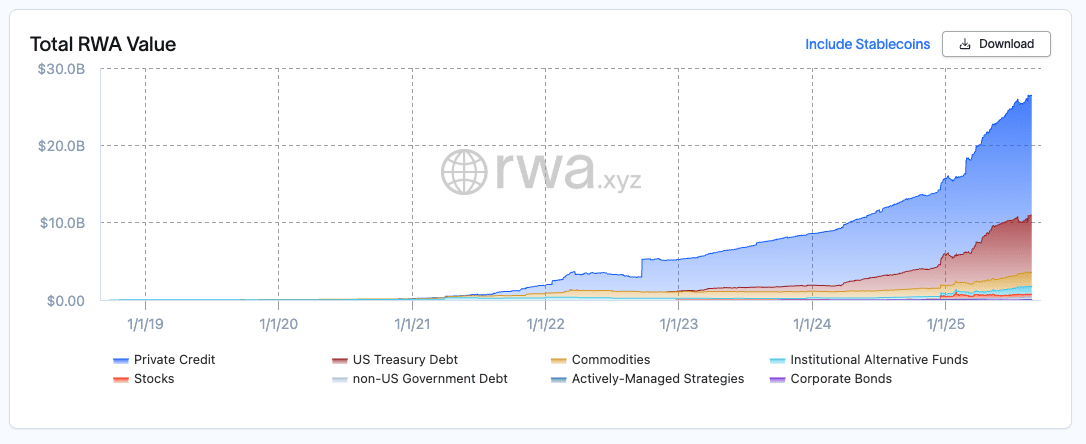WFE Exchange Association writes to regulators: Strict regulation of tokenized stocks is necessary
The technology that converts real assets such as stocks and real estate into digital tokens on the blockchain (known as RWA) has quietly surpassed a market size of $26 billion. However, according to reports from (Reuters), the World Federation of Exchanges (WFE), representing major global stock exchanges, has recently urgently called for regulators to closely monitor this, warning that this emerging commodity may carry significant risks.
 Source: RWA.xyz
Source: RWA.xyz
Potential risks of tokenized stocks: Nominal holding rather than actual ownership
WFE, in a letter to the U.S. Securities and Exchange Commission (SEC) crypto task force, the European Securities and Markets Authority (ESMA), and the International Organization of Securities Commissions (IOSCO), stated that a large number of brokers and cryptocurrency trading platforms are offering or intending to offer so-called U.S. tokenized stocks, and they are shocked by this. Currently, the entities that received the letter have not responded to (Reuters) requests for comments.
WFE points out that although these products are marketed as tokenized stocks or equivalent to stocks, this is not the case. The core issue with tokenized stocks is that they merely "mimic" real stocks while lacking the core rights and protections that traditional equity should have.
Although investors nominally own tokens representing company shares, they do not become legitimate shareholders of the company, and thus do not enjoy voting rights, dividend distributions, or traditional custodial protections.
In many cases, investors are even unable to redeem tokens for real stocks, and the only way to exit the market is to sell on the issuing platform.
 Source: WFE Exchange Association WFE writes to regulators: Strict regulation of tokenized stocks is necessary
Source: WFE Exchange Association WFE writes to regulators: Strict regulation of tokenized stocks is necessary
WFE warns that if these tokenized products fail or encounter issues, the companies being mimicked could also suffer serious reputational damage. For example, the trading platform Robinhood launched tokenized stocks in Europe, which even included the unlisted company OpenAI, but OpenAI immediately clarified that it had never authorized or participated in this and does not endorse it.
Although many supporters believe that tokenized stocks can reduce trading costs, accelerate settlement, and enable around-the-clock trading, WFE believes that the potential risks far outweigh the benefits.
WFE states that their position reflects the concerns of market infrastructure participants and the entire financial industry, as some stock issuers have expressed concerns to their exchanges. Regulators should apply securities regulations to tokenized assets, clarify the legal framework for ownership and custody rights, and prevent them from being marketed as stocks.
Currently, the market value of tokenized stocks only accounts for a small portion of the $26 billion RWA market, but several well-known cryptocurrency platforms, such as Coinbase, Robinhood, and Kraken, have already invested in or planned to enter this emerging field.
Further reading:
Selling OpenAI tokens goes wrong! European regulators focus on Robinhood, equity on the blockchain may cross the red line
Kraken continues to layout, xStocks supports Tron, Tesla and Apple stocks are available for purchase!
Traditional finance and crypto innovation continue to clash, with stablecoin regulation becoming a precedent
WFE's letter has sparked discussions in the industry, with foreign media (Cointelegraph) interpreting it as an action by traditional financial lobbying groups to slow down the pace of blockchain innovation, and this is not the first time this has happened.
Previously, during the deliberation of the (GENIUS Stablecoin Act) in the U.S. Congress, banking groups successfully lobbied to exclude yield-generating stablecoins from the bill, which is seen as a move to protect their own deposit business.
However, platforms offering stablecoin yield services quickly found loopholes, with executives from Coinbase and PayPal promising shareholders that although the government prohibits stablecoin yields, they would still work to provide attractive "reward programs" for stablecoin holders.
Further reading:
The Genius Act bans stablecoin issuers from earning interest! Two platforms exploit loopholes: We will change to 'rewards'
Crypto Mom emphasizes: Tokenized stocks must still comply with securities laws
Facing backlash from traditional finance, regulators have previously expressed a clear stance: to regulate by analogy to securities laws.
Hester Peirce, known in the crypto community as 'Crypto Mom', has emphasized that tokenized securities (including tokenized stocks) must still comply with existing securities regulations. She specifically warned that in the case of third-party tokenization, buyers may face unique risks, such as counterparty risk.
Distributors of tokenized securities must also consider disclosure obligations under federal securities laws, while market participants buying and trading tokenized securities must consider the nature of the resulting impacts of securities laws.
Despite emphasizing regulatory requirements, Peirce also shows a modern and open attitude: "When the unique aspects of technology require changes to existing rules, or when regulatory requirements are outdated or unnecessary, we are always ready to work with market participants to develop appropriate exemptions and modernize the rules."
Further reading:
Crypto Mom reminds: Tokenized stocks are still securities, and blockchain cannot allow stocks to evade regulation!
The article 'Exchange Association writes to three major regulators: Strict regulation of tokenized stocks, these products carry significant risks' was first published in 'Crypto City'
